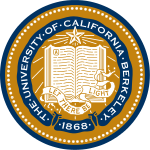
Back Universiteit van Kalifornië, Berkeley Afrikaans جامعة كاليفورنيا (بركلي) Arabic جامعة كاليفورنيا (بيركيلى) ARZ Universidá de California en Berkeley AST Berkli Kaliforniya Universiteti Azerbaijani کالیفورنیا، برکلی بیلیمیوردو AZB Каліфарнійскі ўніверсітэт у Берклі Byelorussian Uniwersitèt Kaliporni di Bèrkeli BEW Калифорнийски университет – Бъркли Bulgarian ক্যালিফোর্নিয়া বিশ্ববিদ্যালয়, বার্কলি Bengali/Bangla
 | |
Former names | University of California (1868–1958) |
|---|---|
| Motto | Fiat lux (Latin) |
Motto in English | "Let there be light" |
| Type | Public land-grant research university |
| Established | March 23, 1868[1] |
Parent institution | University of California |
| Accreditation | WSCUC |
Academic affiliations | |
| Endowment | $7.4 billion (2023)[2] |
| Chancellor | Richard Lyons |
| Provost | Benjamin E. Hermalin[3] |
Total staff | 23,524 (2020)[4] |
| Students | 45,307 (fall 2022)[5] |
| Undergraduates | 32,479 (fall 2022)[5] |
| Postgraduates | 12,828 (fall 2022)[5] |
| Location | , United States 37°52′19″N 122°15′30″W / 37.87194°N 122.25833°W |
| Campus | Core central: 178-acre (72-hectare)[6][7] Large suburb: 8,164-acre (3,304-hectare)[8] |
| Newspaper | The Daily Californian |
| Colors | Berkeley Blue California Gold[9] |
| Nickname | Golden Bears |
Sporting affiliations | |
| Mascot | Oski the Bear |
| Website | berkeley |
 | |
The University of California, Berkeley (UC Berkeley, Berkeley, Cal, or California)[10][11] is a public land-grant research university in Berkeley, California, United States. Founded in 1868 and named after the Anglo-Irish philosopher George Berkeley, it is the state's first land-grant university and is the founding campus of the University of California system.[12]
Berkeley has an enrollment of more than 45,000 students. The university is organized around fifteen schools of study on the same campus, including the College of Chemistry, the College of Engineering, and the Haas School of Business. It is classified among "R1: Doctoral Universities – Very high research activity".[13] The Lawrence Berkeley National Laboratory was originally founded as part of the university.[14]
Berkeley was a founding member of the Association of American Universities and was one of the original eight "Public Ivy" schools. In 2021, the federal funding for campus research and development exceeded $1 billion.[15] Thirty-two libraries also compose the Berkeley library system which is the sixth largest research library by number of volumes held in the United States.[16][17][18]
Berkeley students compete in thirty varsity athletic sports, and the university is one of eighteen full-member institutions in the Atlantic Coast Conference (ACC). Berkeley's athletic teams, the California Golden Bears, have also won 107 national championships, 196 individual national titles, and 223 Olympic medals (including 121 gold).[19][20] Berkeley's alumni, faculty, and researchers include 55 Nobel laureates[21] and 19 Academy Award winners,[22] and the university is also a producer of Rhodes Scholars,[23] Marshall Scholars,[24] and Fulbright Scholars.[25]
- ^ "A brief history of the University of California". Academic Personnel and Programs. Archived from the original on October 21, 2020. Retrieved August 24, 2020.
- ^ As of June 30, 2023; Total Endowment Assets. "Annual Endowment Report, Fiscal Year Ended June 30, 2023" (PDF). University of California.
- ^ "Home | Executive Vice Chancellor and Provost". evcp.berkeley.edu. Retrieved July 7, 2022.
- ^ "About Berkeley: What We Do". Archived from the original on October 28, 2021. Retrieved October 24, 2021.
- ^ a b c "UC Berkeley Quick Facts". UC Berkeley Office of Planning and Analysis. Retrieved October 21, 2021.
- ^ "College Navigator – University of California-Berkeley". National Center for Education Statistics.
- ^ "UC Berkeley Zero Waste Plan" (PDF). University of California-Berkeley. September 2019. p. 5. Retrieved October 12, 2020.
- ^ "University of California 21/22 Annual Financial Report" (PDF). University of California. Archived from the original (PDF) on May 23, 2023. Retrieved February 20, 2023.
- ^ "Primary Palettes". Berkeley Brand Guidelines. University of California, Berkeley. Retrieved May 7, 2017.
- ^ "Trademark Use Guidelines and Requirements" (PDF). University of California, Berkeley. Retrieved February 18, 2018.
- ^ "Our Name". The Berkeley Brand Manual (PDF). Berkeley: University of California, Berkeley: Office of Communications and Public Affairs. June 2019. p. 34. Archived from the original (PDF) on June 7, 2020. Retrieved June 23, 2020.
- ^ "History & discoveries". University of California, Berkeley. Retrieved November 7, 2016.
- ^ "Carnegie Classifications: University of California-Berkeley". Carnegie Foundation for the Advancement of Teaching. Retrieved February 24, 2015.
- ^ "Berkeley Lab: What's in a Name?". www.lbl.gov. Retrieved July 24, 2024.
- ^ "Table 20. Campus funding for sponsored research tops $1 billion for first time". Berkeley News. August 16, 2021. Retrieved August 16, 2021.
- ^ "Berkeley Library Facts" (PDF). www.lib.berkeley.edu. Archived from the original (PDF) on July 1, 2022. Retrieved August 17, 2020.
- ^ "New addition to UC Berkeley Main Library dedicated to former UC President David Gardner". Berkeley.edu. June 12, 1997. Retrieved June 8, 2012.
- ^ "The Nation's Largest Libraries". American Library Association. July 7, 2006. Archived from the original on November 25, 2022.
- ^ "California Golden Bears Olympic Medals". University of California Golden Bears Athletics. Retrieved March 14, 2021.
- ^ "Cal National Champions". University of California Golden Bears Athletics. Retrieved March 14, 2021.
- ^ "Berkeley's Nobel laureates". UC Berkeley Inspire. Retrieved September 20, 2024.
- ^ "Berkeley Law Distinguished Alumni". sfgate.com. February 26, 2012.
- ^ "US Rhodes Scholars Over Time". www.rhodeshouse.ox.ac.uk. Archived from the original on November 25, 2020. Retrieved November 23, 2020.
- ^ "Statistics". www.marshallscholarship.org. Archived from the original on January 26, 2017. Retrieved November 2, 2020.
- ^ "Top Producers". us.fulbrightonline.org. Archived from the original on October 28, 2020. Retrieved November 4, 2020.